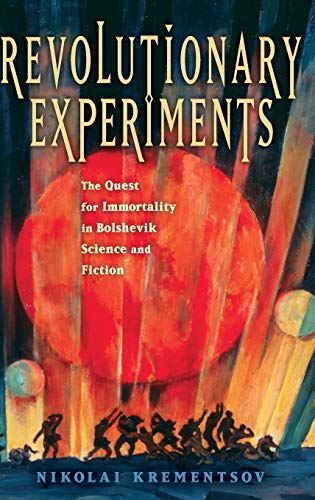Articles liés à Revolutionary Experiments: The Quest for Immortality...
Revolutionary Experiments: The Quest for Immortality in Bolshevik Science and Fiction - Couverture rigide

L'édition de cet ISBN n'est malheureusement plus disponible.
Afficher les exemplaires de cette édition ISBNLes informations fournies dans la section « A propos du livre » peuvent faire référence à une autre édition de ce titre.
- ÉditeurOUP USA
- Date d'édition2014
- ISBN 10 0199992983
- ISBN 13 9780199992980
- ReliureRelié
- Nombre de pages288
- Evaluation vendeur
Acheter neuf
En savoir plus sur cette édition
Frais de port :
Gratuit
Vers Etats-Unis
Meilleurs résultats de recherche sur AbeBooks
Revolutionary Experiments The Quest for Immortality in Bolshevik Science and Fiction
Description du livre HRD. Etat : New. New Book. Shipped from UK. THIS BOOK IS PRINTED ON DEMAND. Established seller since 2000. N° de réf. du vendeur L1-9780199992980
Revolutionary Experiments: The Quest for Immortality in Bolshevik Science and Fiction
Description du livre Etat : New. PRINT ON DEMAND Book; New; Fast Shipping from the UK. No. book. N° de réf. du vendeur ria9780199992980_lsuk
Revolutionary Experiments: The Quest for Immortality in Bolshevik Science and Fiction
Description du livre Hardback. Etat : New. This item is printed on demand. New copy - Usually dispatched within 5-9 working days. N° de réf. du vendeur C9780199992980
Revolutionary Experiments The Quest for Immortality in Bolshevik Science and Fiction
Description du livre HRD. Etat : New. New Book. Delivered from our UK warehouse in 4 to 14 business days. THIS BOOK IS PRINTED ON DEMAND. Established seller since 2000. N° de réf. du vendeur L1-9780199992980
Revolutionary Experiments (Hardcover)
Description du livre Hardcover. Etat : new. Hardcover. Who are we? Where did we come from and where are we going? What is the meaning of life and death? Can we abolish death and live forever? These "big" questions of human nature and human destiny have boggled humanity's best minds for centuries. But they assumed a particular urgency and saliency in 1920s Russia, just as the country was emerging from nearly a decade of continuous warfare, political turmoil, persistent famine, and deadly epidemics, generating an enormousvariety of fantastic social, scientific, and literary experiments that sought to answer these "perpetual" existential questions. This book investigates the interplay between actual (scientific) andfictional (literary) experiments that manipulated sex gonads in animals and humans, searched for "rays of life" froze and thawed butterflies and bats, kept alive severed dog heads, and produced various tissue extracts (hormones), all fostering a powerful image of "science that conquers death." Revolutionary Experiments explores the intersection between social and scientific revolutions, documenting the rapid growth of science's funding, institutions, personnel, public resonance, andcultural authority in the aftermath of the 1917 Bolshevik Revolution. It examines why and how biomedical sciences came to occupy such a prominent place in the stories of numerous litterateurs and in the cultureand society of post-revolutionary Russia more generally. Nikolai Krementsov argues that the collective, though not necessarily coordinated, efforts of scientists, their Bolshevik patrons, and their literary fans/critics effectively transformed specialized knowledge generated by experimental biomedical research into an influential cultural resource that facilitated the establishment of large specialized institutions, inspired numerous science-fiction stories, displaced religious beliefs, andgave the millennia-old dream of immortality new forms and new meanings in Bolshevik Russia. This book examines the transformation of specialized biomedical knowledge into an influential cultural resource that facilitated the establishment of large specialized institutions, inspired numerous science-fiction stories, displaced religious beliefs, and gave the millennia-old dream of immortality new forms and new meanings in Bolshevik Russia. This item is printed on demand. Shipping may be from multiple locations in the US or from the UK, depending on stock availability. N° de réf. du vendeur 9780199992980
Revolutionary Experiments: The Quest for Immortality in Bolshevik Science and Fiction
Description du livre Etat : new. N° de réf. du vendeur FrontCover0199992983
Revolutionary Experiments: The Quest for Immortality in Bolshevik Science and Fiction
Description du livre Hardcover. Etat : new. New Copy. Customer Service Guaranteed. N° de réf. du vendeur think0199992983

